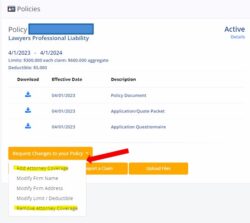OBLIC lawyers’ professional liability (LPL) policies cover “Named Insured” attorneys as identified on the Schedule of Insureds in each issued policy. As attorneys join or exit a firm throughout a policy period, your issued policy must be updated to ensure the correct attorneys are covered by the policy.
Adding and removing attorneys from your firm’s policy is quick and simple through the MyOBLIC portal. Simply navigate to www.oblic.com on a Google Chrome or Firefox browser and click Login at the top of the page. Once logged in, select the orange drop-down button “Request Changes to your Policy” and select “Add Attorney Coverage” or “Remove Attorney Coverage” as needed.

When adding an attorney to your policy, you will need to identify the requested effective date, which may correspond with the date the attorney joined the firm. If the requested effective date is earlier than 60 days from the date of the request, then a No Known Claims Affirmation will be required. Further, you will then be asked for the attorney’s full name, bar number, state(s) and date(s) of admission, email address, full time or part time status, email address, whether the attorney is a member of the OSBA or the Ohio Bar College, and the requested prior acts date.
When removing an attorney from your policy, you will be asked to select the attorney being removed and to identify the effective date of the change. The effective date may be as of the date requesting the change or later, but not earlier than the date of the requested policy change.
When adding an attorney, your premium will be impacted, and you will receive a quote for the additional premium from your underwriter. Conversely, if removing an attorney, your premium will be adjusted, and you will receive notice of how that adjustment will be reflected on your account.
Protecting your firm in the event of a claim of discrimination, wrongful termination, harassment and other claims, the Employment Practices Liability Endorsement (“EPLE”) will also apply to newly added attorneys unless your firm opted out of the endorsement. The $100 per attorney per policy year EPLE premium will also be added at the time of renewal. To learn more about EPLE from OBLIC, read our recent post here.
If establishing an Of Counsel relationship with an attorney, there are a number of factors to consider in such an arrangement. In addition to coverage considerations, the Rules of Professional Conduct govern aspects of an Of Counsel arrangement. Before entering into an Of Counsel arrangement, you may wish to consult with an ethics attorney. Remember that one benefit of your OBLIC LPL policy is a complimentary ethics consult per insured attorney per policy period. Read on to learn more about complimentary ethics consults and contact OBLIC’s Loss Prevention attorneys to set up your consult.
* Please refer to the OBLIC policy and contact your underwriter for more information.


